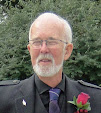It is 13 days since I arrived home from my last visit South when I started on the Drugs Trial and had the last attempt to get rid of Cal. It seems like and age. I know that I've done things. I remember having my 3-monthly bum-jab to help keep C (the Big Yin, not Cal) under control and hugging Lisa when she told me I was not diabetic as had been previously diagnosed. I remember coffee one afternoon with a friend in The Woodlands. I think I was compos mentis that afternoon - I hope that I was. I remember long periods sleeping on my recliner or in bed. I know that I must have done a lot of other things too. However for the most part my overwhelming memory is of just not functioning and being so unwell last Sunday and Monday that I couldn't even persuade the medical practice receptionist that I really, really did need to see a doctor ungently. I must have been very non-compos mentis.
On Monday when I did see a doctor she took one look at me and rang the hospital. I emerged yesterday afternoon a tired, but new, person after enough intravenous antibiotics for an elephant and, apparently, a worrying (for others - I wasn't able to think clearly enough to care) time. Apparently the various medical teams here and in Ayr have agreed that the team here clean up my infections and next Thursday the Ayr Team will have another go at Cal.
In the meantime this evening an almost-lifelong friend who lives in Canada arrives to stay with me on her way home from Africa.
The Glad Game:
I woke up this morning.
I didn't have MRSA and sepsis did not set in.
The medical staff at Western Isles Hospital are BRILLIANT!
I slept so soundly last night I didn't wake, turn over or even crumple the bedclothes for EIGHT hours.
My life is never, ever, boring.
I have wonderful friends and family who look out for me.
My life is never, ever, boring.
I have wonderful friends and family who look out for me.




